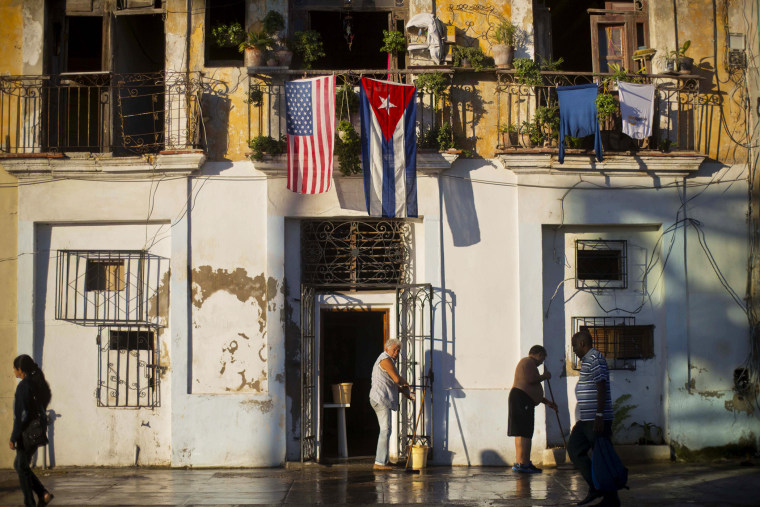It's been about five months since President Obama's unexpected breakthrough on U.S. policy towards Cuba, and the New York Times reports today that diplomatic progress has brought the countries to a point that seemed unthinkable in the recent past.
The United States and Cuba are closer than ever to reaching an agreement to fully restore diplomatic relations and reopen embassies, officials in both countries said as negotiators met Thursday in Washington for another round of talks to iron out remaining details and discuss possible dates. The move toward full diplomatic relations broken decades ago during the Cold War has been seen as a key step toward ending hostilities and normalizing ties with a historic opponent that once agreed to allow Soviet nuclear missiles on its soil and repelled an invasion by American-backed insurgents.
A senior State Department official told the paper, "I'm trying not to sound too Pollyannaish. But I do think we're closer than we have been in the past, and I think my counterparts are coming up here with a desire to get this done."
It's against this backdrop that Sen. Marco Rubio (R-Fla.) -- the one who characterizes himself as a forward-thinking foreign-policy expert, unwed to the old way of doing things -- has vowed to block any nominee the White House sends to the Senate to serve as a U.S. Ambassador to Cuba. Yesterday, the Florida Republican also condemned loosened travel restrictions.
Rubio summarized his case in a fairly straightforward way at the Council on Foreign Relations last week: "In recent years, the ideals that have long formed the backbone of American foreign policy -- a passionate defense of human rights, the strong support of democratic principles, and the protection of the sovereignty of our allies -- have been replaced by, at best, caution, and at worst, outright willingness to betray those values for the expediency of negotiations with repressive regimes."
At first blush, that might even sound persuasive. Why would the United States try to find common ground with dictatorships? Why reward bad behavior?
The problem, whether Rubio appreciates these details or not, is that a U.S. foreign policy that limits diplomacy exclusively to democratic allies wouldn't be an effective foreign policy.
Indeed, Rubio's argument has come up before. When Nixon went to China -- one of the more important diplomatic breakthroughs in the modern era -- there were critics who condemned the Republican White House for negotiating with a repressive regime. When Reagan reached out to the former Soviet Union, much of the right was disgusted by the abandonment of American "principles." A president was trying diplomacy with an evil superpower pointing nuclear weapons at us? Why had Reagan abandoned our ideals?
The Republican senator, who really should pick a new signature issue, needs to realize that talking to friends is easy, and talking to enemies is hard, but meaningful foreign-policy breakthroughs are always the result of risks and rigor. Sometimes, great countries have to engage far-from-great foes in order to advance broader goals.
If Rubio refuses to believe this, and he intends to limit the scope of American diplomacy, he's outlining a very specific kind of presidential platform that the foreign-policy establishment should find rather alarming.
